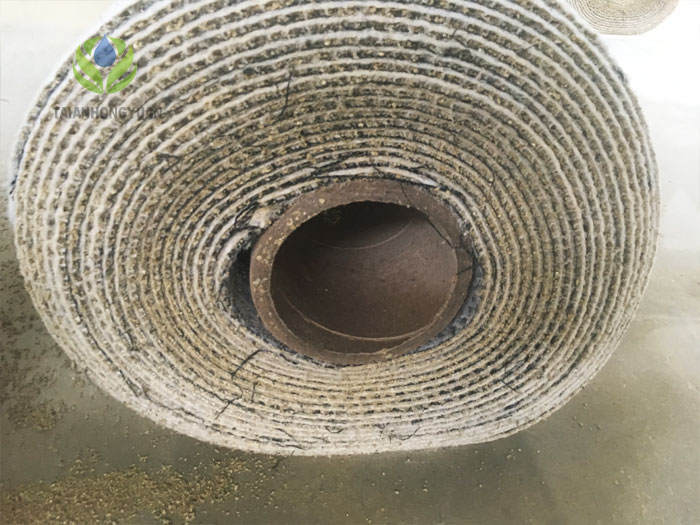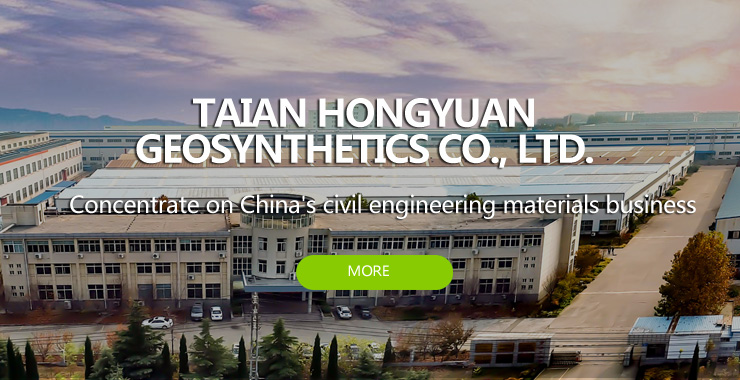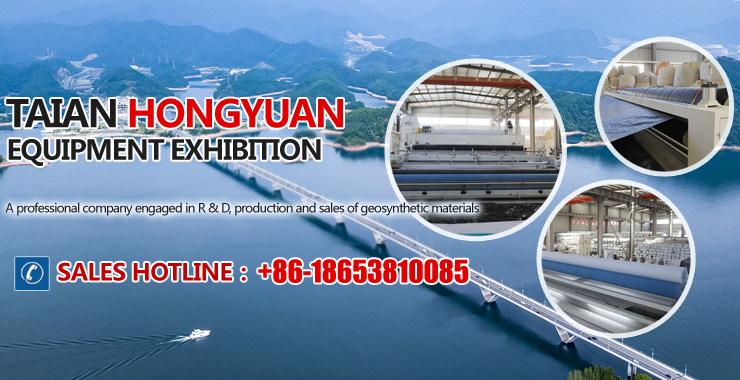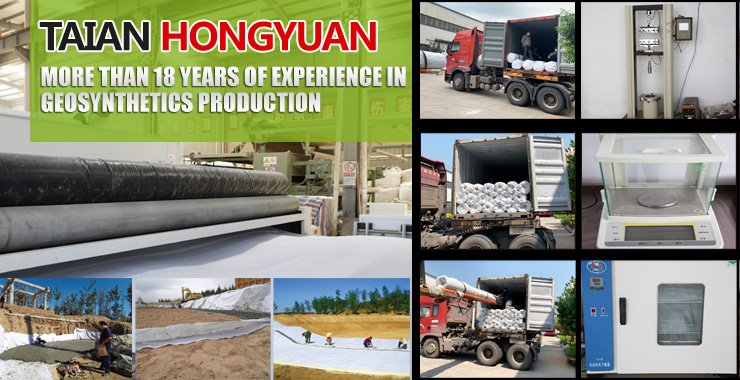
| ■ Product description |
It is composed of 3 levels. The upper level and the lower level are woven geotextile and non woven textile. The middle level is bentonite grains, which are carefully selected crude and filled in between the two levels after special processing. The bentonite grain in GCL made by this method does not flow in a fixed direction. It distributes evenly and forms waterproof layer, owning excellent waterproof effect. This GCL is a kind of new green waterproof materials, which are widely applied in many waterproof construction projects.
GCL can be applied separately, or combined with high density polyethylene (HDPE). Our GCL combines the two advantages together, not only containing all the properties of geotextile materials, but also bearing of double waterproof property.

Our GCL have two kind of types that are GCL-NP and GCL-OF. The GCL-NP type are consisted of three layers, the top is nonwoven geotextile, the middle is sodium bentonite, and the bottom is woven geotextile. This type GCL is widely used in landfill, lagoon, river bottom, and basement and so on. The GCL-OF have four layers including the introduced three layers, which have one additional HDPE membrane bonded with the nonwoven geotextile to form the compound waterproofing layer. This kind GCL is widely used in subway, basement, tunnel, and other underground projects and salt water area and harsh environment.
| ■ Features |
1. Environment friendly
GCL is made of raw materials of sodium-bentonite. It is raw and natural materials,; aging and corrosion seldom happen. It can keep its quality and then it does not cause any injuries and pollution for human and the environment. It is not only waterproof, but also has good ventilation performance. It can stick up for the exchange of the ecological environment. It is a pure
2. Permanent waterproof, excellent performance
Natural sodium bentonite was formed billions of years ago.
Its waterproof properties are much more durable than that of the buildings. Sodium bentonite would transform to high density septum under hydro pressure. When The thickness is 3mm, the permeability is below a×10-11/sec(a=1~9), which equals to the density of 100 times of the clay with 30 mm thickness. Water retention performance is evident.
3. Easy to construct
Bentonite powder, nails and washers are enough for connection and fixation. Construction is not constrained by weather conditions and it could be taken under cold or wet conditions. Bentonite powder is spread on overlap point. When water comes, GCL would be overlapped automatically. It is so far the only material that starts the waterproof effect by water in the world. It is not necessary to take additional examination when the construction is completed. The repair works are easy in case of waterproof defects. Among the existing waterproof materials, GCL construction period is the shortest and its operation is the easiest. It has an eminent effect on shortening the construction period as well as saving the cost.
4. Strong Self-Restore Capacity
The integration between waterproof material and its target enables GCL a 20~28 times swelling volume. Even if concrete structure trembles or subsides, the bentonite in GCL would restore the crack of 2mm or below on the concrete structure immediately. Even if the diameter of perforation reaches 30 mm, the restoration will be finished within 15 days completely.
| ■ Waterproof mechanism |
Sodium bentonite is non-metallic clay composed mostly of the mineral montmorillonite. It is formed from volcanic ash and is mined out of Wyoming and South Dakota. Montmorillonite is a layered clay mineral with broad, flat platelets that are ideally shaped to provide a hydraulic barrier. Sodium ions located between these platelets allows water to hydrate the bentonite in a remarkable fashion that results in the high swelling characteristic. Dry sodium bentonite can swell to many times its original volume when exposed to water. Because of its high swelling capability bentonite is able to seal around penetrations, giving geosynthetic clay liners their self-healing characteristic. A fully hydrated layer of sodium bentonite will result in a hydraulic conductivity of less than 5 x 10-9 cm/sec. This is approximately twenty times lower than a typical compacted clay layer.
| ■ Matching Accessories |
1.Bentonite sealing powder. It is the identical to the bentonite grain of the GCL used as the lap between GCL.
2.Package: 50kg per woven geotextile bag.
| ■ Applications |
1.waterproof for rooftop garden、basement and so on;
2.waterproof for underground、railway、city highway、oil drilling and so on;
3.Anti-seepage project of mud and stone reinforce;
4.Desert and environment improvement、trash stuff zone、artificial lake and artificial sight and so on;
5.Reservoir、dam、irrigation channel and so on.

| ■ Performance |
| NO. | Test item | Technique data | Remark |
| 1 | Expansion coefficient (ml/2g) | ≥24 | ASTM-D5890 |
| 2 | Water percentage (%) | ≤12 | ASTM-D4643 |
| 3 | Fluid loss (ml) | ≤18 | ASTM-D5891 |
| 4 | Tensile strength(longitudinal and transverse) (KN) | ≥10 | ASTM-D4632 |
| 5 | Peeling strength (N) | ≥65 | ASTM-D4632 |
| 6 | mass area ratio of bentonite (g/m2) | >5000(Uniform compound, no negative deviation) | |
| 7 | vertically osmotic coefficient (cm/s) | <5×10-9 | ASTM-D5084 |
| 8 | Index flux (m³/㎡·s) | <5×10-8 | ASTM-D5887 |
| ■ Loading quantity |
| Item | width(m) | Length(mm) | Loading quantity/20'GP(m2) |
| 3600g/㎡ | 5.8 | 35 | Around 4060 |
| 4000g/㎡ | 5.8 | 35 | Around 3857 |
| 4500g/㎡ | 5.8 | 35 | Around 3654 |
| 4800g/㎡ | 5.8 | 35 | Around 3248 |
| 5000g/㎡ | 5.8 | 35 | Around 3248 |
| 5250g/㎡ | 5.8 | 35 | Around 3045 |
| Previous:Geosynthetic clay liner | next:Landscape project |




 Tel
Tel
 Products
Products
 Contact
Contact
 Home
Home